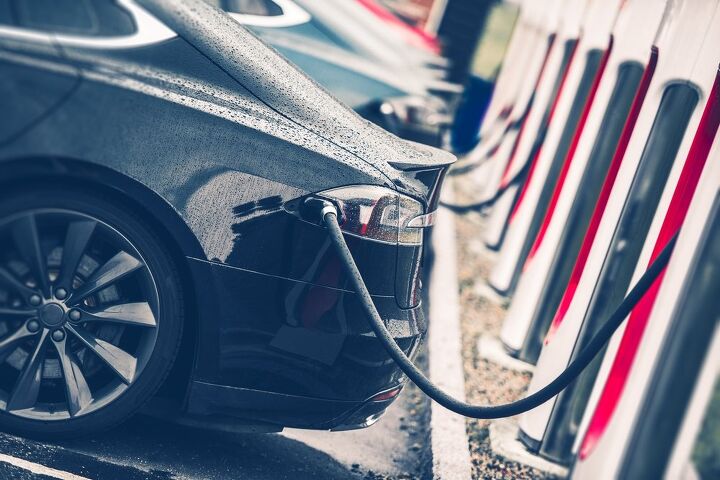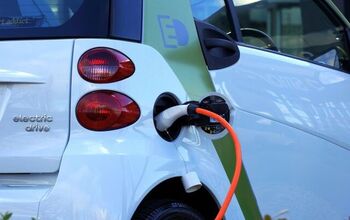Congress Says Nay to Expanding EV Tax Credits

Prior to Congress taking the rest of the month off to relax and presumably gear up for an impeachment trial, they first had to settle their year-end tax package. Automakers were hoping that would include an extension of electric vehicle tax credits, but it was a doomed proposition.
An extension was initially included in the bipartisan Driving America Forward Act, which manifested this spring, before being incorporated into the Democrat-friendly GREEN Act (Growing Renewable Energy and Efficiency Now). That got it through the House but not the Republican-controlled Senate, which wasn’t interested.
While the current $7,500 EV tax credit remains in place, Tesla and General Motors have both reached their 200,000-vehicle quota. Naturally, they (and other automakers) lobbied for an expansion, one which would have seen a $7,000 credit kept in place until a manufacturer sold 600,000 electric automobiles. Several Republican lawmakers openly shared their distaste for the plan, though few more openly than Senator John Barrasso of Wyoming, who had an opposing bill — called the Fairness for Every Driver Act — interested in reducing subsidies on the grounds that EV credits have already done enough.
Citing the over $4 billion in federal credits EV shoppers had already received, Barrasso claimed the system has already encouraged automakers to commit t manufacturing more electric cars, arguing it’s no longer fair to burden taxpayers.
Barrasso said it’s time to refocus on infrastructure (including adding more EV charging stations), allowing states to expand on subsidies if they choose, remaining highly critical of where those federal credits have been going. “Nearly 80 percent of the tax credits go to households earning at least $100,000 a year,” he said. “These car buyers don’t need a taxpayer subsidy.”
President Donald Trump was also alleged to have been against expanding EV credits, according to Senator Debbie Stabenow (D-MI). “There has been extreme resistance from the president,” she told Bloomberg last week. “I don’t know why the White House would want to stop jobs and the future of the auto industry.”
Studies have indicated that widespread electrification may actually hurt jobs, as EVs require less manpower to manufacture (and with the brunt of battery labor typically performed outside of the United States). However, the counterpoint has often been that pushing new tech will help grow high-tech professions. Unfortunately, the White House only agrees with the former positio, warning Congress that taking a stand on EV subsidies could stymie the year-end tax package.
“Frankly, I was surprised that anyone at any automaker thought there was a realistic chance of the 200,000 cap being increased in the current administration,” Navigant analyst Sam Abuelsamid told Automotive News this week.
If you’re wondering how dire the situation is for automakers, it depends on which ones you’re talking about. General Motors and Tesla will probably see interest drop now that the credits are drying up, but the next manufacturers to hit the 200,000-unit mark are likely several years away from having to be truly concerned. By then, EVs could be so good (or affordable?) that it might not matter.
[Image: Welcomia/Shutterstock]

A staunch consumer advocate tracking industry trends and regulation. Before joining TTAC, Matt spent a decade working for marketing and research firms based in NYC. Clients included several of the world’s largest automakers, global tire brands, and aftermarket part suppliers. Dissatisfied with the corporate world and resentful of having to wear suits everyday, he pivoted to writing about cars. Since then, that man has become an ardent supporter of the right-to-repair movement, been interviewed on the auto industry by national radio broadcasts, driven more rental cars than anyone ever should, participated in amateur rallying events, and received the requisite minimum training as sanctioned by the SCCA. Handy with a wrench, Matt grew up surrounded by Detroit auto workers and managed to get a pizza delivery job before he was legally eligible. He later found himself driving box trucks through Manhattan, guaranteeing future sympathy for actual truckers. He continues to conduct research pertaining to the automotive sector as an independent contractor and has since moved back to his native Michigan, closer to where the cars are born. A contrarian, Matt claims to prefer understeer — stating that front and all-wheel drive vehicles cater best to his driving style.
More by Matt Posky
Latest Car Reviews
Read moreLatest Product Reviews
Read moreRecent Comments
- Todd In Canada Mazda has a 3 year bumper to bumper & 5 year unlimited mileage drivetrain warranty. Mazdas are a DIY dream of high school auto mechanics 101 easy to work on reliable simplicity. IMO the Mazda is way better looking.
- Tane94 Blue Mini, love Minis because it's total custom ordering and the S has the BMW turbo engine.
- AZFelix What could possibly go wrong with putting your life in the robotic hands of precision crafted and expertly programmed machinery?
- Orange260z I'm facing the "tire aging out" issue as well - the Conti ECS on my 911 have 2017 date codes but have lots (likely >70%) tread remaining. The tires have spent quite little time in the sun, as the car has become a garage queen and has likely had ~10K kms put on in the last 5 years. I did notice that they were getting harder last year, as the car pushes more in corners and the back end breaks loose under heavy acceleration. I'll have to do a careful inspection for cracks when I get the car out for the summer in the coming weeks.
- VoGhost Interesting comments. Back in reality, AV is already here, and the experience to date has been that AV is far safer than most drivers. But I guess your "news" didn't tell you that, for some reason.


































Comments
Join the conversation
The EV subsidies are still a fraction of the petroleum subsidies. I'm in favor of killing both.
I expect much better of the B&B, and somewhat better of TTAC's writers, to not fall for or regurgitate the bait. Let's clarify: "over $4 billion in federal credits EV shoppers had already received" All this means is that the EV buyers didn't pay marginal taxes on the credit amounts. The amount "missing" from the federal treasury is much, much lower. “Nearly 80 percent of the tax credits go to households earning at least $100,000 a year,” As well it should, if we understand Econ101. First, early adopters pay more and must have the disposable income. Second, we don't know the percentage of these households that are in HCOL areas. $100k in W2 wages in NYC or SF, if you have a family, is a pittance. Those are also the areas where EVs make the most sense and provided the most value/return. This is cheap class warfare bait and especially disappointing coming from a Republican. “Frankly, I was surprised that anyone at any automaker thought there was a realistic chance of the 200,000 cap being increased in the current administration,” More unnecessary divisive partisan bait. Trump is, mostly, a mercantilist. Continuing to jump-start an industrial technology where the USA is currently far-and-away leading makes economic sense. This in addition to the greater social good from EVs. I do believe Trump is petty enough to not do it if it benefits states that vote against him versus states that vote for him. But certainly a case can be made that he would go for the economic argument. Finally, nothing is "dire". This will retard adoption, but EV majority conversion is inevitable. Sometimes TTAC feels like the Buggy Whip Guild.